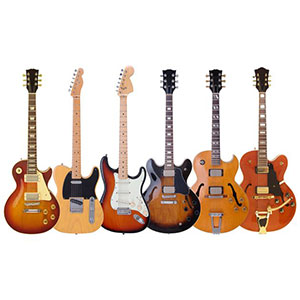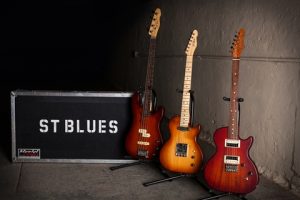- Home
- Instruments
- Gear
- Recording
- Lessons
- Reviews
- Blog

If you are on the market to find a guitar that will give you that warm bluesy tone, you are probably going to be looking around for what some might call a blues guitar. The problem with this approach lies within the core nature of blues.
Contrary to popular belief, blues is not a single genre of music that is standardized in terms of tone, or even technique. Instead, it's an umbrella term for a wide range of genres that share some features with each other. This single piece of information complicates the choice of a guitar for blues music to a certain extent.
Compared to something like metal music, where you know you want to have two humbuckers capable of delivering high output, a guitar for blues isn't that easy to define. This is mostly because blues is as much about the tone as it is about the notes you play.
You could take a piece of scrap acoustic guitar and still play blues if you wanted to. Or you could buy the most expensive Gibson and achieve similar results. Our mission today is to figure out what a blues guitar is, and what are some things you need to know before going shopping for one.
 If you took the top 50 blues guitarists of all times and watched their live shows, you would see a whole range of guitars being used. Much like it's the case with jazz music, choosing which guitar's setup you like the most for blues is a very personal decision. Generally, just about any guitar will give you a more than decent blues tone granted you have a good enough amp. That warmth which is synonymous with blues, along with a slight growl is a result of a good amp giving taking advantage of decent guitar pickups.
If you took the top 50 blues guitarists of all times and watched their live shows, you would see a whole range of guitars being used. Much like it's the case with jazz music, choosing which guitar's setup you like the most for blues is a very personal decision. Generally, just about any guitar will give you a more than decent blues tone granted you have a good enough amp. That warmth which is synonymous with blues, along with a slight growl is a result of a good amp giving taking advantage of decent guitar pickups.
With that said, there are some guitars that tend to appear more than others in blues music. For example, you will see a lot of Gibson Les Pauls, but also a whole lot of Stratocasters. If you want to know why this is the case, check out our article here ‘Blues Guitars – Single Coils or Humbuckers?'.
This variety brings forward a very interesting question. The two guitars we have just mentioned sport two different types of pickups. Strat has single coils while Les Paul has humbuckers. So which one is better? Well, it all depends on a variety of factors. For certain genres of blues, Strat will be the better choice since it has that crisp tone and overall clarity. On the other hand, if you want more width, you will probably have much better time using a Les Paul with its two potent humbuckers.
The point we are trying to make here is that understanding blues is a must before you go shopping for a guitar. Once you realize there are many different genres of blues, each favoring a different type of guitar, things will start to clear up a bit.
 The nature of a pickup is important as well. No matter which design you go for, whether it's a single coil or a humbucker, you will want to have a set that is versatile. Some people prefer vintage pickups in order to achieve that classic blues sound of the early '60s, while others are more flexible. Again, it all comes down to personal preference.
The nature of a pickup is important as well. No matter which design you go for, whether it's a single coil or a humbucker, you will want to have a set that is versatile. Some people prefer vintage pickups in order to achieve that classic blues sound of the early '60s, while others are more flexible. Again, it all comes down to personal preference.
When you set out to get yourself a blues guitar, don't be too concerned with the design and appearance of the guitar. What you are looking for is a tone fidelity that suits your needs the best. You might find out that a Strat is a better option, or even a high tier Yamaha. Once you get the tone down, everything else comes in a distant second place.
With that said, different guitars will offer different sound properties depending on what kind of amp you are running at the moment. Generally, the best results – or should we say the most organic ones – are achieved with a tube amp that is pushed into that sweet performance band. As a matter of fact, some people will insist that a good amp is much more important for blues than the choice of guitar you are using. Figuring out what kind of blues you want to play will dictate how much time and money you should invest in your guitar.
When it comes to blues music, the stuff you play and how you play it will have a pretty huge impact on your tone. Blues is a very expressive type of music to play on a guitar. It relies on your ability to tell a story with your fingers in a way that reflects emotion.
As your experience and technique evolve, your style will start to crystallize. You will soon recognize exactly what kind of tone you are after, but you will also know exactly how to get it. This is not something that happens overnight, nor should it. Growing as a musician is a very rewarding experience. This is especially true in terms of blues music.
The more you practice and play, the more personalized your music will be. Don't worry if you pick up a guitar now only to find out that it doesn't really suit you all that well several years down the road. If that happens, it will mean that your taste has changed over time, and you should adjust your gear accordingly.
With all this stuff out of the way, feel free to dive straight into our list of Best Blues Guitars on the market today.

Reader Interactions